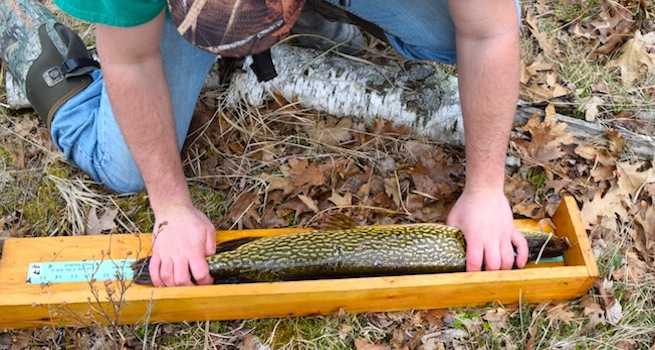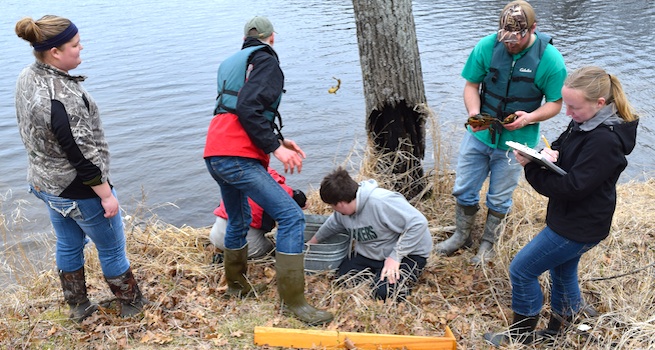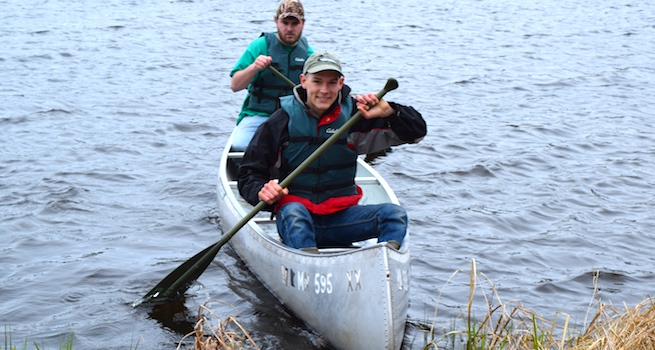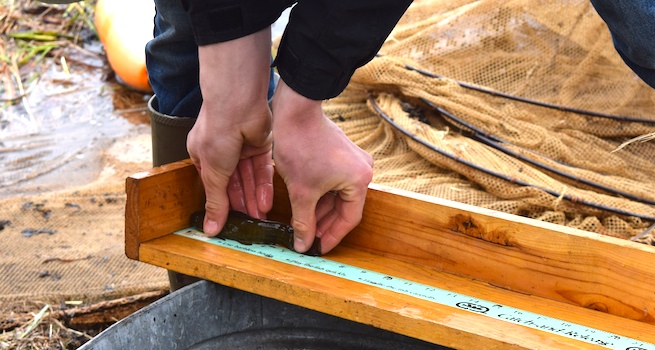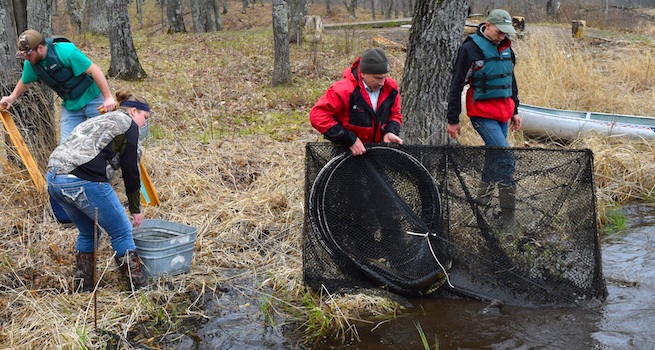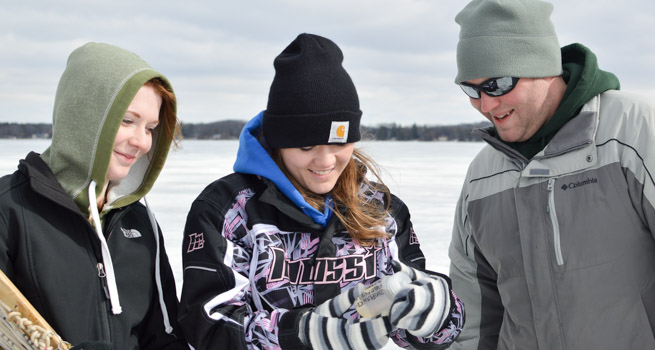Natural Resources Technology A.A.S. Degree
Career Description
People in the natural resources work with environmental systems and human needs to manage a variety of resources in a sustainable fashion. Natural resources professionals regularly deal with issues such as biodiversity, economics, population trends, and the future quality of human life. The best opportunities for full-time work will require a bachelor’s degree from a four-year university in one of the natural resource disciplines or from a more holistic natural resource management degree. Some agencies (e.g., MN DNR Forestry) are beginning to hire students with two-year degrees for permanent, full-time work. Potential careers include forestry technician, wildlife manager, fisheries manager, fisheries technician, parks manager, park naturalist, hydrologist, soils scientist, and botanist.
Program Information
For more than fifty years, the CLC Natural Resources Program has been providing students with a well-rounded background in natural resources, preparing them for work in a variety of fields. Courses in the natural resources program at Central Lakes College include a strong outdoor laboratory component, reinforcing classroom learning through application of these skills and knowledge in the field. Many of the first-year courses are blocked together to allow additional time for outdoor laboratories and opportunities to work on multidiscipline projects. Students also have the opportunity to experience additional extracurricular opportunities through paid summer internships offered by a variety of natural resources agencies, and participation in the Natural Resources Club that provides students with outdoor-based activities throughout the year, such as radio-tracking collared animals, administering deer check stations, and hosting interpretive programs. The relatively small size of the Natural Resource Program allows students the opportunity to know their instructors personally and to develop friendships with other students that last a lifetime.
Program Outcomes
Graduates will be able to:
- Demonstrate field identification of regionally important plants, mammals, birds and fish and their communities;
- Use a broad range of technological tools to research, document, map, measure, record and analyze data relevant to natural resources;
- Interpret how ecological relationships influence plants, mammals, birds and fish distribution, succession and biodiversity in ecosystems;
- Analyze land characteristics and create land management plans;
- Communicate in oral and written forms with supervisors, peers, area visitors and natural resource agencies;
- Navigate and safely function in an outdoor workplace.
Special Program Requirements
In addition to the program requirements, students must meet the following conditions in order to graduate:
- College Cumulative GPA Requirement: cumulative grade point average (GPA) of credits attempted and completed at CLC must be at least 2.0;
- College Technical Core GPA Requirement: cumulative GPA of credits attempted and completed towards the technical core of the diploma or degree must be at least 2.0;
- Residency Requirement: students must complete 25% of their credits at Central Lakes College.
Transfer Opportunities
The Central Lakes College Natural Resources Program offers an affordable alternative to a four-year institution. Through a formal agreement, graduates of the program have the opportunity to transfer to the University of Wisconsin at Stevens Point, WI and Bemidji State University to complete a baccalaureate degree.
Employment Statistics
For more information regarding employment statistics, career salary information and estimated job growth, follow the resource links below:
https://apps.deed.state.mn.us/lmi/ces/
http://www.bls.gov/ooh/home.htm
Salary information from indeed.com
Program Course Requirements
Required Discipline Courses (48 credits)
NATR 1112 Land Measurement, 3 cr
NATR 1115 Plant Taxonomy, 2 cr
NATR 1120 Dendrology, 3 cr
NATR 1125 Ichthyology, 3 cr
NATR 1130 Mammalogy, 3 cr
NATR 1135 Ornithology, 3 cr
NATR 1140 Limnology, 3 cr
NATR 1200 Introduction to Natural Resources, 3 cr
NATR 1280 Introduction to GPS and GIS (Arc), 2 cr
NATR 2110 Herpetology, 2 cr
NATR 2120* Wetland Ecology, 3 cr
NATR 2130* Wildlife Management, 3 cr
NATR 2140* Fisheries Management, 3 cr
NATR 2155 Soil Science, 3 cr
NATR 2161* Ecosystem Management, 2 cr
NATR 2170* Advanced GPS and GIS, 2 cr
NATR 2201 Introduction to Parks and Interpretation, 2 cr
NATR 2235* Silviculture and Forest Management, 3 cr
Required MnTC Courses
An A.A.S. degree requires a minimum of 15 credits selected from at least three of the ten goal areas of the Minnesota Transfer Curriculum (MnTC).
BIOL 2415 General Ecology (Goals 3,10), 4 cr
COMM 1410 Intro to Communication Studies (Goal 1) OR
COMM 1420 Interpersonal Communication (Goal 1) OR
COMM 1430 Public Speaking (Goals 1,2) OR
COMM 2420 Intercultural Communication (Goals 1,7A,7B), 3 cr
ENGL 1410 Composition I (Goal 1), 4 cr
ENGL 1411 Composition II (Goal 1), 4 cr
*Denotes Prerequisites
GRADUATION REQUIREMENT – 63 CREDITS
Program Instructors
| Photo | First Name | Last Name | Position | Department | Phone | Alt. Phone: | URL | wdt_ID | Details | |
|---|---|---|---|---|---|---|---|---|---|---|
 |
Aubrey | Beadell | Advisor | TRIOStudentSupportServices | (218) 855-8014 | aubrey.beadell@clcmn.edu | 1 | More details | ||
 |
Nick | O'Reilly | Occupational Skills Program College Lab Assistant | OccupationalSkills | 218-855-8077 | Nicholas.oreilly@clcmn.edu | 2 | More details | ||
 |
Kevin | Lomax | Automotive Lab Assistant | Automotive Faculty | 218-855-8000 | KLomax@clcmn.edu | 3 | More details | ||
 |
Jody | Flynn | Accessibility Services Assistant | Accessibility | 218-855-8056 | jody.flynn@clcmn.edu | 5 | More details | ||
 |
Deana | Bobzien | Instructor | CollegeCareerStudies - Mathematics - Supportive Services | 218-855-8339 | deana.bobzien@clcmn.edu | 7 | More details | ||
 |
Brianna | Rajkowski | Advisor | TRIOStudentSupportServices | 218-855-8228 | brianna.rajkowski@clcmn.edu | 8 | More details | ||
 |
Tajia | Anderson | PSEO Specialist | Admissions - CollegeCreditInHighSchool- PSEO | (218) 855-8079 | tajia.anderson@clcmn.edu | 10 | More details | ||
 |
David | Gray | Instructor | History | 218-855-8189 | david.gray@clcmn.edu | 14 | More details | ||
 |
Jim | Nagy | Adjunct Instructor | GraphicDesign | 218-855-8157 | james.nagy@clcmn.edu | 15 | More details | ||
 |
Brandon | Schneider | Instructor | HeavyEquipment | 218-894-5179 | brandon.schneider@clcmn.edu | 16 | More details | ||
 |
Natalia | DePauw | Director of Dual Enrollment | PSEO - CollegeCreditInHighSchool - Advising | 218-855-8263 | natalia.depauw@clcmn.edu | 18 | More details | ||
| Amy | Disterhaupt | Admissions Specialist | Admissions | 218-855-8250 | amy.disterhaupt@clcmn.edu | 20 | More details | |||
 |
Nick | Heisserer | Dean of Brainerd Career & Technical Programs | Administration | 218-855-8067 | nick.heisserer@clcmn.edu | 21 | More details | ||
 |
Matthew | Krueger | Environmental Health and Safety Officer | Maintenance - Security - Safety | 218-855-8115 | matthew.krueger@clcmn.edu | 22 | More details | ||
 |
Mark | Lindquist | Instructor | Music | 218-855-8203 | mark.lindquist@clcmn.edu | 23 | More details | ||
 |
Jeremy | Goddard | Bookstore/Print Shop | Bookstore Supportive Services | 218-855-8146 | Jeremy.Goddard@clcmn.edu | 25 | More details | ||
 |
Sarah | Jennissen | Instructor | PracticalNursing | 218-894-5308 | sarah.jennissen@clcmn.edu | 26 | More details | ||
 |
Cash | Robinson | Academic Advisor | TRIOUpwardBound - Advising | 218-855-8035 | cash.robinson@clcmn.edu | 28 | More details | ||
 |
Ryan | Wright | Enrollment Representative | Admissions - CampusTours | 218-855-8013 | ryan.wright@clcmn.edu | 31 | More details | ||
 |
Steve | Wenzel | Instructor | PoliticalScience | 218-855-8073 | stephen.wenzel@clcmn.edu | 32 | More details | ||
 |
Julie | Woitalla | Instructor | NursingASDegree | 218-855-8168 | julie.woitalla@clcmn.edu | 33 | More details | ||
 |
Josh | Zaborowski | Upward Bound Advisor | TRIOUpwardBound - Assessment | 218-855-8032 | joshua.zaborowski@clcmn.edu | 35 | More details | ||
 |
Paul | Zimmerman | Instructor | Diesel Faculty | 218-894-5143 | paul.zimmerman@clcmn.edu | 36 | More details | ||
 |
Ed | Uhlenkamp | Instructor | FarmBusinessManagement | 218-894-5160 | edward.uhlenkamp@clcmn.edu | https://dynamicforms.ngwebsolutions.com/ShowForm.aspx?RequestedDynamicFormTemplate=32c40b45-028c-46d6-9f79-9c1edc503713 | 38 | More details | |
 |
James | Velde | Instructor | FarmBusinessManagement | 218-234-3981 | james.velde@clcmn.edu | https://dynamicforms.ngwebsolutions.com/ShowForm.aspx?RequestedDynamicFormTemplate=cff3bff4-005f-4f5c-82a8-4c6aed02c8e9 | 39 | More details |
Photo:
First Name:
Last Name:
Position:
Phone:
Email:

